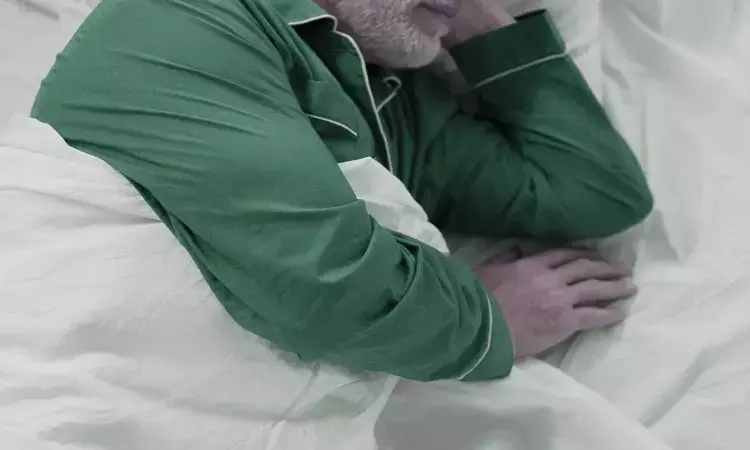- Home
- Medical news & Guidelines
- Anesthesiology
- Cardiology and CTVS
- Critical Care
- Dentistry
- Dermatology
- Diabetes and Endocrinology
- ENT
- Gastroenterology
- Medicine
- Nephrology
- Neurology
- Obstretics-Gynaecology
- Oncology
- Ophthalmology
- Orthopaedics
- Pediatrics-Neonatology
- Psychiatry
- Pulmonology
- Radiology
- Surgery
- Urology
- Laboratory Medicine
- Diet
- Nursing
- Paramedical
- Physiotherapy
- Health news
- Fact Check
- Bone Health Fact Check
- Brain Health Fact Check
- Cancer Related Fact Check
- Child Care Fact Check
- Dental and oral health fact check
- Diabetes and metabolic health fact check
- Diet and Nutrition Fact Check
- Eye and ENT Care Fact Check
- Fitness fact check
- Gut health fact check
- Heart health fact check
- Kidney health fact check
- Medical education fact check
- Men's health fact check
- Respiratory fact check
- Skin and hair care fact check
- Vaccine and Immunization fact check
- Women's health fact check
- AYUSH
- State News
- Andaman and Nicobar Islands
- Andhra Pradesh
- Arunachal Pradesh
- Assam
- Bihar
- Chandigarh
- Chattisgarh
- Dadra and Nagar Haveli
- Daman and Diu
- Delhi
- Goa
- Gujarat
- Haryana
- Himachal Pradesh
- Jammu & Kashmir
- Jharkhand
- Karnataka
- Kerala
- Ladakh
- Lakshadweep
- Madhya Pradesh
- Maharashtra
- Manipur
- Meghalaya
- Mizoram
- Nagaland
- Odisha
- Puducherry
- Punjab
- Rajasthan
- Sikkim
- Tamil Nadu
- Telangana
- Tripura
- Uttar Pradesh
- Uttrakhand
- West Bengal
- Medical Education
- Industry
Sleep quality linked to psychiatric diseases, finds study using accelerometer data

Multiple measures of sleep patterns and sleep efficiency are associated with lifetime diagnoses of mental illness, according to a new study that used wrist accelerometer data to track sleep.
The study is publishing October 12th in the open-access journal PLOS Medicine by Shreejoy Trip (CAMH), Canada, and colleagues.
Sleep problems are known to be both symptoms of and modifiable risk factors for many psychiatric disorders. In the new study, researchers collected data on 89,205 individuals participating in the UK Biobank study who wore accelerometers on their wrist for 7 days between 2013 and 2015. The accelerometers were used to generate objective data on sleep timing, duration, efficiency, and variability. Data on psychiatric diagnoses – including schizophrenia spectrum disorders, bipolar disorder, major depressive disorder, and anxiety disorders – as well as other health and sociodemographic information was available for all participants, who ranged in age from 43 to 79 and were 56% female.
The researchers found striking trends when they examined the associations between the sleep measures and inpatient psychiatric diagnoses. Each diagnosis was associated with a mean of 8.5 of the 10 accelerometer-derived sleep measures. Measures of sleep quality, such as sleep efficiency, were generally more affected by psychiatric diagnosis than measures of sleep duration. Effect sizes were small; the largest magnitude effect was observed for the association between sleep efficiency and major depressive disorder. Associations were replicated across ancestries and sexes.
"Our findings provide a rich clinical portrait of the ways in which sleep can be disrupted across individuals with lifetime mental illness," the authors say. "This work showcases the capacity of accelerometry to provide detailed, objective sleep measurements at scale, even across cohorts of tens of thousands of individuals."
The authors add, "This work showcases the power of wearable devices to provide fine-grained information about how sleep is disrupted in mental illness."
https://journals.plos.org/plosmedicine/article?id=10.1371/journal.pmed.1003782
Hina Zahid Joined Medical Dialogue in 2017 with a passion to work as a Reporter. She coordinates with various national and international journals and association and covers all the stories related to Medical guidelines, Medical Journals, rare medical surgeries as well as all the updates in the medical field. Email: editorial@medicaldialogues.in. Contact no. 011-43720751
Dr Kamal Kant Kohli-MBBS, DTCD- a chest specialist with more than 30 years of practice and a flair for writing clinical articles, Dr Kamal Kant Kohli joined Medical Dialogues as a Chief Editor of Medical News. Besides writing articles, as an editor, he proofreads and verifies all the medical content published on Medical Dialogues including those coming from journals, studies,medical conferences,guidelines etc. Email: drkohli@medicaldialogues.in. Contact no. 011-43720751


